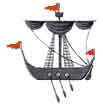Clan Donald Magazine No13 (1995) Online
Litir do Fhear-deasachaidh
Irisleabhar Chlann Domhnaill bho
fhear-deasachaidh Leabhraichean Chlann
Raghnaill by Professor William Gillies,
Dept. of Celtic, University of Edinburgh A Thormoid choir
Leabhraichean Clann
Raghnaill
Tha
mi fhathast an sas anns an obair a ghabh mi os laimh a liuthad
bhliadhnaichean air ais. (Faic Irisleabhar
Clann Domhnaill. 12 (1991), 75-80.) Is beag a shaoil mi aig am
toiseachaidh gum biodh an t-uallach seo orm coig bliadhnaichean
roimh dheireadh an fhicheadamh linn. Se rud mdr a bh'ann, ceart gu
leor, a bhith a' deasachadh sgnobha idhean a rachadh san aonsreath
leabhraichean ri obraichean an da Uilleim eile: an cruinneachadh
grinn a rinn Uilleam MacBhatair de Bhardachd Albannach a Leabhar an
Deadhain, agus Orain Iain Mhic Fhearchair agus An Clarsair Dall aig
Uilleam Mac Mhathain. Ach aig deireadh an latha chan e gnothach gun
chrich a bh'ann. Cha b'e 's chan e, agus ruigidh an t-each mall am
muileann fhathast. Gu dearbh, chan eil fada ri dhol aige a-nise. Cha
bhiodh e doirbh dhomh obrachadh a-mach ann an uairean a thide de na
tha ri dheanamh fhathast. Se a' cheist, ge ta, cuin a gheibh
sgoilear ann an oilthigh anns an latha a th'ann na h-uairean a thide
ud - an deidh meadhon oidhche? Am madainn La na Sabaid? Oidhche na
Nollaig no Oidhche na Bliadhn'Uire? Dh'fhas cuisean cho riaslach,
ann an saoghal Ard-fhoghlaim air fad, 's tiach urrainn don
mhor-chuid againn a bhith cinnteach cuin a bheirsinn na proiseactan
pearsanta rannsachaidh againn gu crich.
Chan
ann a' sireadh leisgeulan a tha mi: sann a shaoil mi nach bu mhisde
dhomh cur air shuilean do dhaoine ciamar a tha cuisean o thainig an
creideamh meallta 'nar measg gun tig blath air foghlum agus
sgoilearachd fo riaghailtean a bhuineas ri gniomhachas agus
cunntasachd. A dh'aindeoin sin uile tha mi a' cumail orm. Tha mi a'
cur arm is eideadh air cuid de mo bheachdan ann am paipearan
sgoilearail, agus bidh mi fhathast a' faighinn tide airson cur ris
an leabhar mhdr nuair a theid each a chadal. Cha leid mi fodha gun
spairn.
One
of the little puzzles which I have not yet solved to my satisfaction
was mentioned in Newsletter No 157 of the Clan Donald Society of
Edinburgh (September 1992), after I had mentioned it to members
attending a talk I gave then. Perhaps I may explain it again, in
case readers may be able to see a solution. In the so-called 'Red
Book of Clanranald', on which I base my forthcoming
edition of the
Clanranald Histories, the scribe, Niall MacMhuirich, consistently
writes a catchword at the foot of each page of the manuscript. That
is, he writes in at the end the word that will appear first on the
next page. This is a useful aid to concentration when one is copying
from another source, and can prevent confusion should leaves
subsequently come apart and be in danger of losing their correct
sequence. So far, so good. I have also been aware for a good while
that there are a number of instances in Niall's text where he writes
a word twice in the middle of a page. I never thought much of this
at first, since Niall is apt to be careless at times, making false
starts which he then corrects. More recently, when I was entering
the text into the computer, I noticed that these doubled words
seemed to be coming up at regular intervals. In places I could pick
up sequences of two or more such doublets with closely equivalent
numbers of words between
them. That
suggests that Niall has been copying from an exemplar with
catch�words, and copying them in intermittently. This, if true, is
extremely useful evidence for Niall's methods and may even have a
bearing on the question of the missing 'real' Red Book. I reckon
that the pages of the exemplar must have been a little larger than
those of the surviving 'Red Book', or perhaps the writing was a
little smaller. At all events, our manuscript is, on my hypothesis,
a copy of another, at least with respect to the early history of
Clan Ranald and the period of the Lordship of the Isles. But I still
wonder a little: why on earth would Niall have thought it was a good
idea to copy his exemplar's catchwords into the body of his text?
Various ideas have occurred to me, but none is completely
satisfactory. Perhaps someone else can come up with the definitive
answer. I hope I will not have to fall back on the remark that was
made by Standish Hayes O'Grady, in his Catalogue of Irish
Manuscripts in the British Museum, to characterise the aberrations
of one particular scribe - namely, that he begged leave to 'doubt
that ink was the only liquid available' on the writer's desk as he
wrote.
|
Is mise |
Best wishes |
|
Le meas |
Yours sincerely |
|
Uilleam
MacGill'Iosa |
William Gillies |
|

